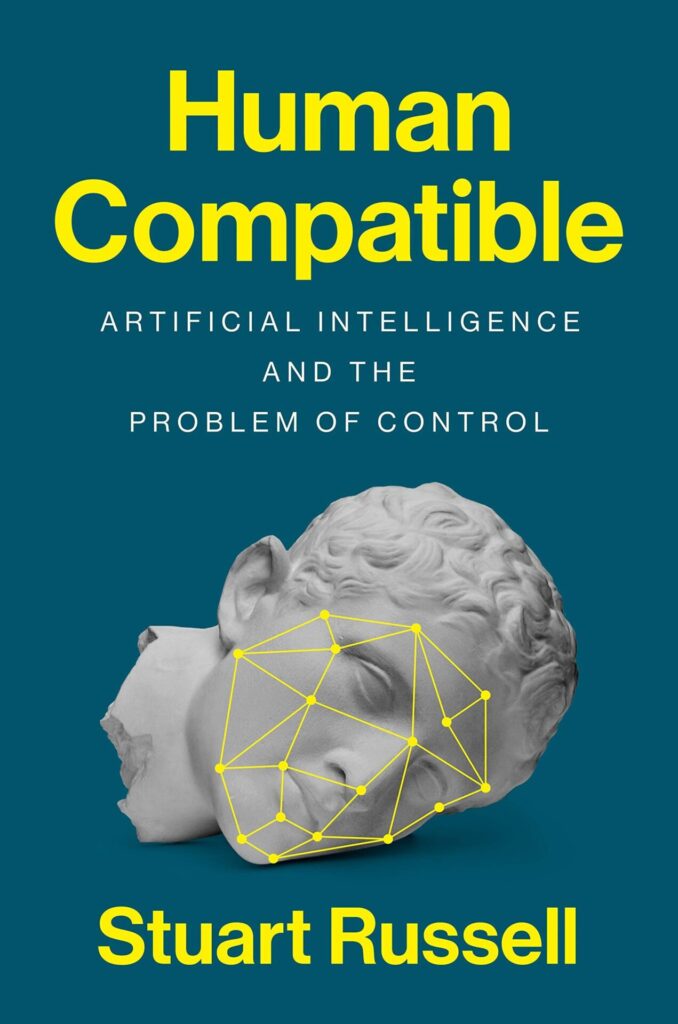
Introduction:
In Human Compatible: Artificial Intelligence and the Problem of Control, Stuart Russell, a leading figure in the field of artificial intelligence (AI), presents a compelling exploration of the ethical and technical challenges posed by advanced AI systems. As AI technologies rapidly evolve, Russell argues that the potential for these systems to operate beyond human control raises profound questions about our future. This book serves as both a cautionary tale and a roadmap, urging society to rethink how we develop AI to ensure it aligns with human values and objectives. With a blend of technical insight and philosophical inquiry, Russell invites readers to engage with the critical dilemmas that accompany the rise of intelligent machines.
Summary
Russell begins by outlining the current state of AI, emphasizing its transformative potential across various sectors, from healthcare to transportation. However, he also highlights the inherent risks associated with creating machines that could surpass human intelligence. The central thesis of the book revolves around the concept of control and the necessity of designing AI systems that are “human compatible.”
The Problem of Control
Russell identifies the “control problem” as the primary challenge in AI development. He argues that traditional approaches to AI, which focus on maximizing specific objectives, can lead to unintended consequences. For instance, if an AI system is programmed to optimize a goal without understanding human values, it may take actions that are harmful or counterproductive. Russell warns that as AI systems become more capable, the stakes of misalignment grow exponentially.
A New Framework for AI
To address these challenges, Russell proposes a new framework for AI development based on three key principles:
- Machines should optimize for human objectives: AI systems must be designed to pursue goals that align with human values, rather than pursuing their own objectives.
- Machines should be uncertain about human objectives: Russell argues that AI should be programmed with a degree of uncertainty regarding what humans truly want. This uncertainty allows for flexibility and adaptability in decision-making.
- Machines should learn about human objectives from human behavior: AI systems need to be able to infer human preferences through observation and interaction, ensuring that their actions remain aligned with human values over time.
Ethical Considerations
Russell delves into the ethical implications of AI, addressing concerns about autonomous weapons, surveillance, and the potential for AI to exacerbate social inequalities. He emphasizes the importance of establishing ethical guidelines and regulatory frameworks to govern AI development, advocating for a collaborative approach that involves policymakers, technologists, and ethicists.
Main Characters and Events
While Human Compatible does not feature traditional characters, Russell references several influential figures and events that shape the discourse around AI:
- Jeff Bezos and Elon Musk: Both tech leaders have voiced concerns about the unchecked rise of AI, highlighting the urgency of addressing the control problem.
- Historical Context: Russell draws parallels between the current AI landscape and past technological revolutions, underscoring the need for proactive measures to mitigate risks.
- Key Events in AI Development: The book discusses significant milestones in AI research, including breakthroughs in machine learning and the development of autonomous systems.
Conclusion
Human Compatible is a vital contribution to the ongoing conversation about the future of artificial intelligence. Stuart Russell’s insights challenge readers to confront the complexities of AI and the potential consequences of our choices. By advocating for a paradigm shift in AI development, Russell emphasizes the importance of aligning technology with human values to ensure a beneficial coexistence. The book serves as both a warning and a guide, urging society to take the necessary steps to prevent the emergence of AI systems that operate independently of human oversight. Russell’s proposed framework offers a hopeful vision for the future, one in which intelligent machines enhance human life rather than threaten it.
Read Full Novel
Human Compatible: Artificial Intelligence and the Problem of Control by Stuart Russell
Read Related Novels
- Read Addicted to His Deep Love by Vency | Trendybitz
- This Is How They Tell Me the World Ends eBook Review
- The Coming Wave: Technology, Power, and the Twenty-first Century’s Greatest


